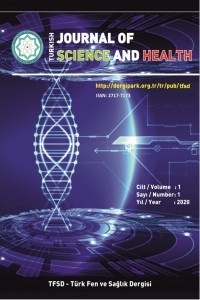Evaluation of Pre-Diagnosis Dietary Habits of Patients with Colorectal Cancer
Evaluation of Pre-Diagnosis Dietary Habits of Patients with Colorectal Cancer
Purpose: The aim of this study was to evaluate the effects of lifestyle and obesity on colorectal cancer patients.
Material and Methods: The study was conducted on 40 patients with colorectal cancer (Patient Group- PG) who received diagnosis in the past 6 months and 40 volunteer adult controls (Control Group- CG) who did not have any digestive system disorders and/or diagnosis of cancer. The questionnaire form, which was developed in order to determine the lifestyle and dietary habits of the individuals, was completed by the patients and the individuals in CG. Anthropometric measurements were taken by the researcher.
Results: The general mean age of the individuals was 59.8 ± 10.3 years in the PG and 59.6 ± 10.6 years in the CG. It was found out that CRC history was present in 10% of the individuals with CRC and the history of other cancer types was present in the families of 32.5% of the individuals with CRC. The pre-diagnostic body weights of the individuals in the patient group were found to be higher than the body weights during the study. Sunflower oil consumption is 87.5% among the individuals in the PG and 67.5% among the individuals in the CG (p
Keywords:
body mass index, colorectal cancer obesity, dietary habits,
___
- Avgerinos, K. I., Spyrou, N., Mantzoros, C. S., et al. (2019). Obesity and cancer risk: Emerging biological mechanisms and perspectives. Metabolism, 92, 121-135. https://doi.org/10.1016/j.metabol.2018.11.001
- Bray, F., Ferlay, J., Soerjomataram, I., et al. (2018). Global cancer statistics 2018: GLOBOCAN estimates of incidence and mortality worldwide for 36 cancers in 185 countries. CA: a cancer journal for clinicians, 68(6), 394-424. https://doi.org/10.3322/caac.21492
- Bresalier, R. S., Kim Y. S. (1998). Malignant neoplasms of the large intestine. Sleisenger and Fordtranˊs gastrointestinal and liver disease, 6, 1906-1942.
- Buyukdogan, M. (2009). Kolorektal kanserde genetik ve etyolojik faktörler. Selcuk Medical Journal, 25(3), 171-180.
- Buyukdogan, M., Boruban, M. C., Artac, M., et al. (2009). Kolorektal Kanserli Hastalarda Sitokrom P450 (CYP2C9 ve CYP2C19) Genetik Polimorfizm Sıklığı. International Journal of Hematology & Oncology/UHOD: Uluslararasi Hematoloji Onkoloji Dergisi, 19(2).
- Caan, B. J., Coates, A. O., Slattery, M. L., et al. (1998). Body size and the risk of colon cancer in a large case-control study. International journal of obesity, 22(2), 178-184.
- Braga, C., Vecchia, C. L., Franceschi, S., et al. (1998). Olive oil, other seasoning fats, and the risk of colorectal carcinoma. Cancer: Interdisciplinary International Journal of the American Cancer Society, 82(3), 448-453. https://doi.org/10.1002/(SICI)1097-0142(19980201)82:3<448::AID-CNCR4>3.0.CO;2-L
- Dong, Y., Zhou, J., Zhu, Y., et al. (2017). Abdominal obesity and colorectal cancer risk: systematic review and meta-analysis of prospective studies. Bioscience reports, 37(6), BSR20170945. https://doi.org/10.1042/BSR20170945
- Fitzmaurice, C., Dicker, D., Pain, A., et al. (2015). The global burden of cancer 2013. JAMA oncology, 1(4), 505-527. https://doi.org/10.1001/jamaoncol.2015.0735
- Gürsoy, Ş., Özlem, E. R., Canöz, Ö., Güven, M., et al. (2003). Kayseri ve yöresinde kolon kanserlerinin özellikleri. Akademik Gastroenteroloji Dergisi, 2(2).
- Heavey, P. M., McKenna, D., Rowland, I. R. (2004). Colorectal cancer and the relationship between genes and the environment. Nutrition and cancer, 48(2), 124-141. https://doi.org/10.1207/s15327914nc4802_2
- Kalaycı, Ş. (2008). SPSS uygulamalı çok değişkenli istatistik teknikleri. Ankara, Asil Yayın Dağıtım.
- Kyrgiou, M., Kalliala, I., Markozannes, G., et al. (2017). Adiposity and cancer at major anatomical sites: umbrella review of the literature. Bmj, 356. https://doi.org/10.1136/bmj.j477
- Lauby-Secretan, B., Scoccianti, C., Loomis, D., et al. (2016). Body fatness and cancer—viewpoint of the IARC Working Group. New England Journal of Medicine, 375(8), 794-798. https://doi.org/10.1056/NEJMsr1606602
- Moghaddam, A. A., Woodward, M., Huxley, R. (2007). Obesity and risk of colorectal cancer: a meta-analysis of 31 studies with 70,000 events. Cancer Epidemiology and Prevention Biomarkers, 16(12), 2533-2547. https://doi.org/10.1158/1055-9965.EPI-07-0708
- NCD Risk Factor Collaboration (NCD-RisC). (2016). Trends in adult body-mass index in 200 countries from 1975 to 2014: a pooled analysis of 1698 population-based measurement studies with 19·2 million participants. Lancet, 387, 1377-1396. https://doi.org/10.1016/S0140-6736(16)30054-X
- Payne, S. (2007). Not an equal opportunity disease–a sex and gender-based review of colorectal cancer in men and women: part I. Journal of Men's Health and Gender, 4(2), 131-139. https://doi.org/110.1016/j.jmhg.2007.03.005
- Shimizu, N., Nagata, C., Shimizu, H., et al. (2003). Height, weight, and alcohol consumption in relation to the risk of colorectal cancer in Japan: a prospective study. British journal of cancer, 88(7), 1038-1043. https://doi.org/10.1038/sj.bjc.6600845
- Topuz, E., Aykan, F. N. 1998). (Sindirim Sistemi Kanserleri. İstanbul Üniversitesi Onkoloji Enstitü Yayınları, 373-475.
- Vaızoglu, S. A., Turhan, T., Temel, F., et al. (2010). Birinci basamakta 50 yaş ve üzeri bireylerde kolorektal kanser ile ilişkili olabilecek bazı faktörlerin ve gaitada gizli kan tetkikine uyumun değerlendirilmesi. Turk J of Geriatrics, 13(2), 79-86.
- Worl Health Organisation. (2021). Cancer. Available from https://www.who.int/news-room/fact-sheets/detail/cancer
- Worl Health Organisation. (2019). Obesity and overweight. Worl Health Organisation https://www.who.int/new+s-room/fact-sheets/detail/obesity-and-overweight
- Başlangıç: 2020
- Yayıncı: Ümit Muhammet KOÇYİĞİT
